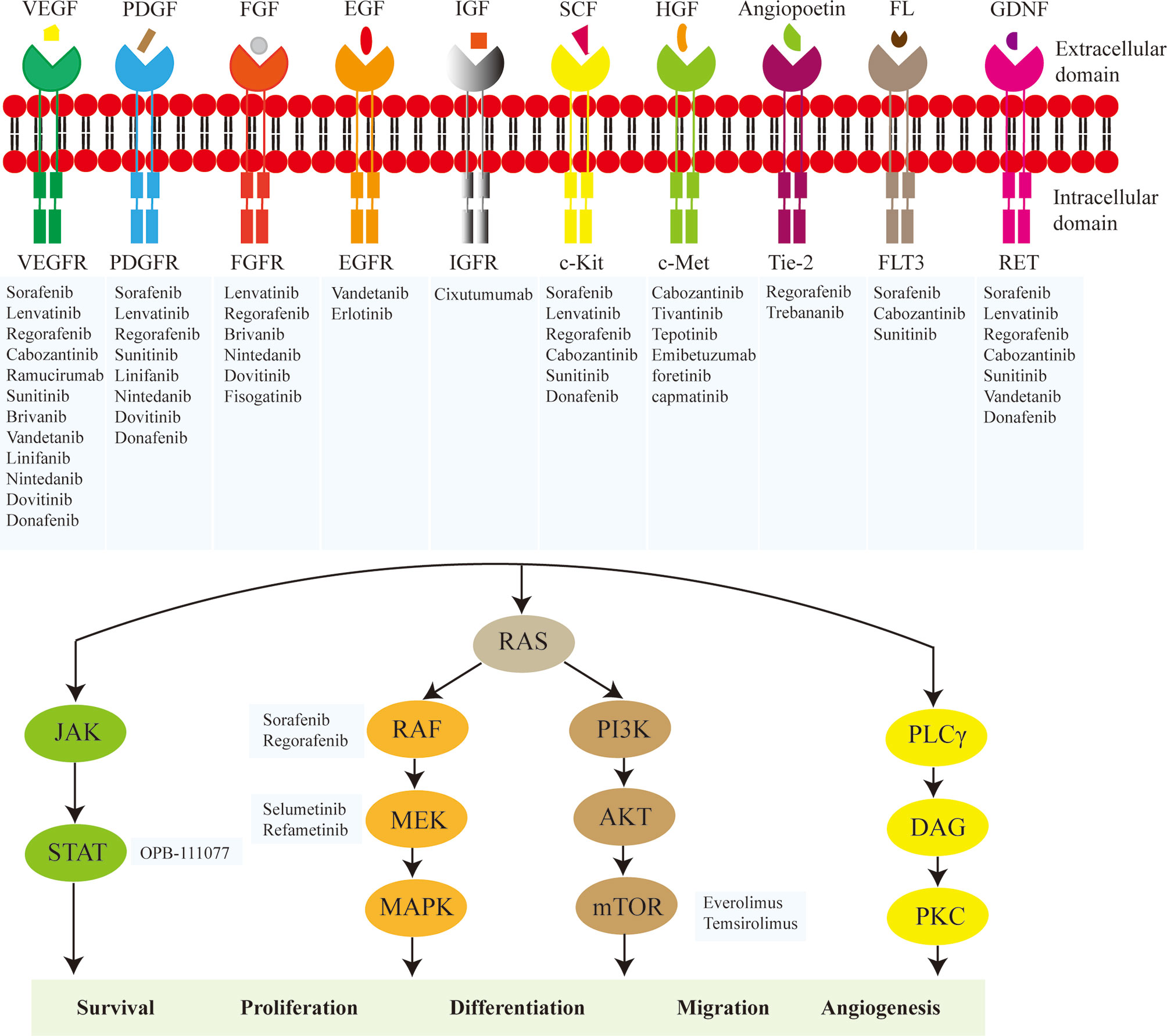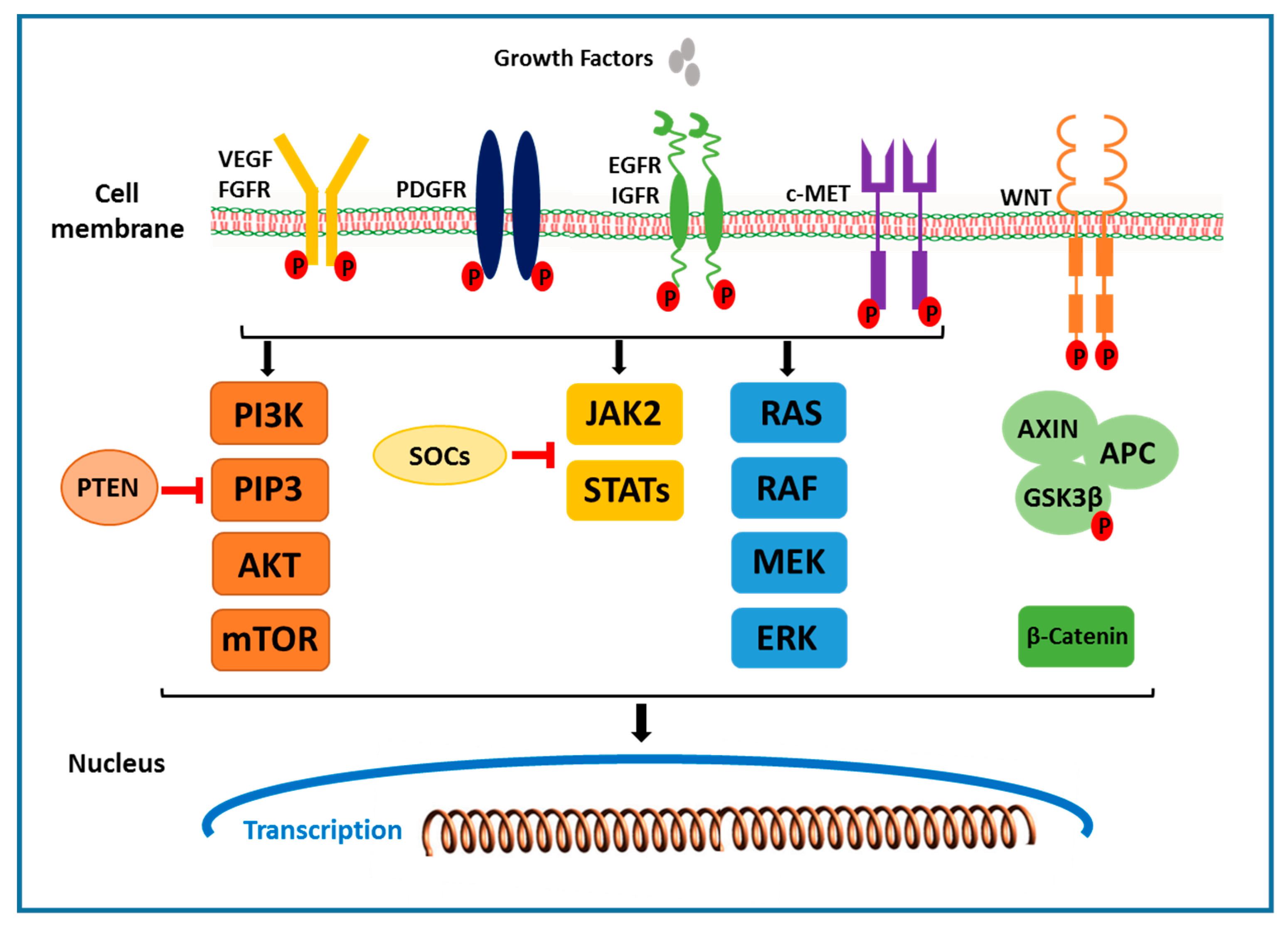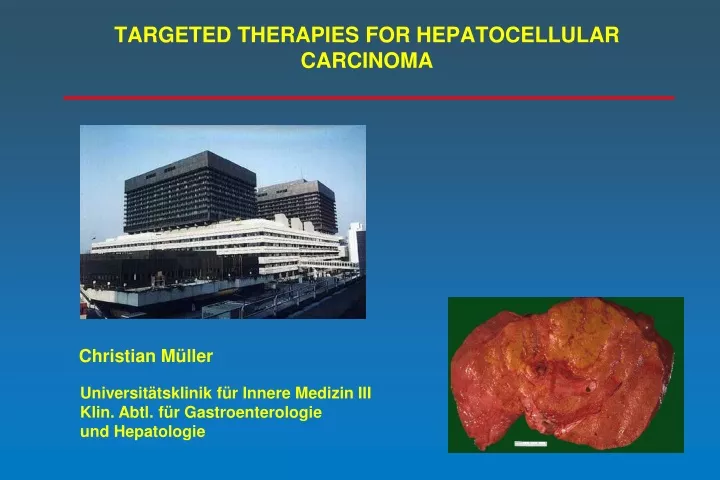Therapeutic options for advanced, unresectable hepatocellular carcinoma (HCC) have changed dramatically over the last 3 years. Ligand-based targeted .Molecular Targeted Therapy.Schlagwörter:Hepatocellular Carcinoma TherapyPublish Year:2020
Targeted therapy for hepatocellular carcinoma
Sorafenib, a tyrosine kinase inhibitor (TKI), has shown clinical efficacy in patients with HCC. Although curative strategies such as hepatectomy and thermal ablation are standard for early-stage cases, high relapse rates drive investigations into .We highlight the mechanism underlying the ineffectiveness of these targeted therapies, including oncogenic alterations in driver genes and downstream .
Hepatocellular Carcinoma
The global burden of hepatocellular carcinoma (HCC) is increasing and might soon surpass an annual incidence of 1 million cases.Department of Ophthalmology, West China Hospital, Sichuan University, Chengdu, China; Background: The incidence of uveitis has risen with the use of targeted .Treatment options for patients with hepatocellular carcinoma are rapidly changing based on positive results from phase 3 trials of targeted and immune-based therapies. Hepatocellular carcinoma (HCC) is one of the most prevalent and lethal cancers, representing a serious worldwide health concern.
Targeted therapy for hepatocellular carcinoma
Schlagwörter:Hepatocellular Carcinoma TherapyHcc CancerTreatment overview. However, the conventional chemotherapy yields low desired response rates due to multidrug resistance .Systematic antitumor therapy is the hope for the treatment of patients with middle-advanced HCC. Research Progresses of Targeted . Liver cancer is the fourth leading cause of cancer-associated death worldwide, accounting for more than 840,000 new cases and 780,000 deaths each year 1,2.There is a need for the development of efficient molecular markers and alternative therapeutic targets of great significance.Schlagwörter:Hepatocellular Carcinoma TreatmentPublish Year:2019

Purpose: The incidence of hepatocellular carcinoma (HCC) is continuously increasing, and the mortality rate remains high. Sorafenib is the only systemic treatment to demonstrate a statistically significant but modest overall survival benefit, leading to an era of targeted agents. The study for HCC is mired in the predicament confronted with the difficulty of early diagnosis and high drug resistance, the survival rate of patients with HCC being low. Owing to the complex pathogenesis, hidden early symptoms, rapidly developing processes, and poor prognosis, the morbidity and mortality of HCC are increasing .Hepatocellular carcinoma (HCC) is the sixed most common malignant tumor in the world.Targeted Therapies for Hepatocellular Carcinoma Treatment: A New Era Ahead—A Systematic Review. Christos Damaskos. Nevertheless, the .


In this review, we describe the . Hepatocellular carcinoma (HCC), one of the most common malignant tumors in China, severely threatens the life and health of patients. While the primary curative treatment for HCC is surgical resection, a major obstacle for the treatment of HCC is the high frequency of tumor recurrence even after curative resection. For patients with unresectable or metastatic HCC, conventional chemotherapy is of limited or no benefit.This Review discusses the current and emerging therapeutic landscape for treatment of advanced hepatocellular carcinoma, including molecular-targeted . Effective palliative treatment is hindered .Schlagwörter:Hepatocellular Carcinoma TreatmentLivers
Targeted therapy for hepatocellular carcinoma
Hepatocellular Carcinoma: Targeted Therapy provides a detailed repository of the latest information regarding HCC epidemiology, diagnosis, imaging, pathology, staging, and treatment options. The recurrence incidence of hepatocellular carcinoma (HCC) following surgery or ablation is as high as 70%. Chemotherapy is recommended to patients with intermediate or advanced stage cancer. The biological process of HCC is complex, with multiple factors leading to the broken of the balance of inactivation and activation of tumor suppressor genes and oncogenes, the abnormal activation of molecular signaling .Schlagwörter:Hepatocellular Carcinoma TherapyHepatocellular Carcinoma TreatmentThis review explores the dynamic landscape of hepatocellular carcinoma (HCC) treatment, emphasizing on recent developments across various stages and therapeutic approaches.

In recent years, with the continuous research on immune checkpoint inhibitors, molecularly targeted drugs combined with immune checkpoint . Studies in patients with lung, breast, or colorectal cancers have indicated that the .Signal Transduction and Targeted Therapy – Camrelizumab (a PD-1 inhibitor) plus apatinib (an VEGFR-2 inhibitor) and hepatic artery infusion chemotherapy for hepatocellular carcinoma in Barcelona . In hepatocellular carcinoma, nivolumab appears particularly promising and recently received US FDA approval. In the advanced stages, systemic treatments allow doctors to obtain clinical benefits, although the prognosis .Despite the great progress of systemic therapies such as molecularly targeted drugs, hepatocellular carcinoma is prone to drug resistance and recurrence, metastasis, and poor prognosis.
Overview of treatment approaches for hepatocellular carcinoma

Immune-based therapies for hepatocellular carcinoma
The past decade has witnessed significant advances in the systemic treatment of advanced hepatocellular carcinoma (HCC).Hepatocellular carcinoma (HCC) accounts for 90% of primary liver cancers.Combination therapies, including anti-angiogenesis agents with ICIs, dual ICIs and targeted agents in conjunction with surgery or other loco-regional therapies, have shown promise and provided the basis for exciting clinical trials.RTKs and its related downstream signaling pathways and their targeted therapies for hepatocellular carcinoma.Hepatocellular carcinoma (HCC) is a common malignancy and one of the leading causes of cancer-related death. While surgical resection, orthotropic liver transplantation, and localized therapeutic options such as ablation, radiation therapy, and embolization remain therapeutics of choice in localized disease, systemic therapy is the .Hepatocellular carcinoma (HCC) is one of the most common malignant tumors worldwide, with nearly one million new cases and deaths every year.Schlagwörter:Hepatocellular Carcinoma TherapySorafenib FLD: Fatty liver disease; HCC: Hepatocellular carcinoma. As a standard systemic therapy option, it tremendously improves the . Ferroptosis, an iron-dependent cell death, has been discovered in recent .Schlagwörter:Hepatocellular Carcinoma TherapyPublish Year:2021 The immune-rich contexture of the HCC microenvironment makes this tumour an appealing target for immune .Core Tip: The present network meta-analysis is the first to compare data from randomized trials of all first-line systemic therapies for hepatocellular carcinoma including chemotherapy, targeted drugs, immunotherapy, and combination therapies. However, there have been no bibliometric analyses of targeted therapies for HCC.Hepatocellular carcinoma (HCC) is the third most frequent cause of cancer-related death. This volume also provides an up-to-date guide for treatment that explores not only traditional treatments, but newer investigational treatment options . This advance has shifted the paradigm of systemic treatment for HCC toward molecular targeted therapy.Hepatocellular carcinoma (HCC) is one of the most common malignancies worldwide and its incidence is still increasing. HCC is the third most common cause of cancer-related death, with a 5-year survival rate of just 3%.Background: Hepatocellular carcinoma (HCC) is an exceedingly prevalent malignancy with an exceptionally poor prognosis.Schlagwörter:Hepatocellular Carcinoma TherapyPublish Year:2020Published:2020 This review aims to summarize the efforts to target molecular components of the signaling pathways that are . Precision Medicine.Despite the expanding implementation of surgical and locoregional therapies worldwide 4 .In the past few decades, new molecular targeted therapies against receptor tyrosine kinases have been developed and clinically evaluated.Schlagwörter:Hepatocellular Carcinoma TreatmentNature Reviews GastroenterologySorafenib has been the preferred first-line treatment option since the SHARP 5 and Asia Pacific 6 trials.Cell Death & Disease – Author Correction: Synergistic immunochemotherapy targeted SAMD4B-APOA2-PD-L1 axis potentiates antitumor immunity in hepatocellular .Furthermore, the analysis represents a comprehensive cross comparison of . Sorafenib was the first .Signal Transduction and Targeted Therapy – Transarterial chemoembolization with PD-(L)1 inhibitors plus molecular targeted therapies for hepatocellular carcinoma (CHANCE001) Skip to main content . The binding of RTKs to their corresponding growth factors can activate their protein kinase function, thereby regulating the downstream signal transduction pathways, expanding signal transduction and activating a series of biochemical reactions .Those targeted therapies exert antitumor effects through specific signals, including anti-angiogenesis or cell cycle progression.Hepatocellular carcinoma (HCC) is the most common primary liver cancer with high morbidity and mortality worldwide. The success of SHARP and Asia-Pacific trial promoted the approval of sorafenib as first-line targeted therapy for advanced HCC, 5 9 ushering in the . Etiology of hepatocellular carcinoma.Hepatocellular carcinoma (HCC) is a global health problem with increasing incidence and mortality 1,2,3.Hepatocellular carcinoma (HCC) is a prevalent malignant tumor, with a growing incidence and death rate worldwide. As a result, novel HCC therapy techniques are urgently required.The primary aim of adjuvant therapy following local treatments like hepatectomy or ablation is to reduce the recurrence rate and thus improve recurrence .Hepatocellular carcinoma (HCC) is the most frequent primitive cancer of the liver, accounting for 90% of all recorded cases. Among adults, HCC is the most common type of liver cancer.The success of SHARP and Asia-Pacific trial promoted the approval of sorafenib as first-line targeted therapy for advanced HCC, 5, 6, 7, 8, 9 ushering in the . Genomic studies have established the landscape of molecular .The most promising targeted therapies for HCC are probably the small-molecule tyrosine kinase inhibitors, such as erlotinib, gefitinib 82 and brivanib, which .Schlagwörter:Hepatocellular Carcinoma TherapyPublish Year:2019 Novel systemic treatment options for HC .Hepatocellular carcinoma is among the solid cancers with the fewest somatic mutations that can be targeted with molecular therapies, 10 and no mutation is used in clinical practice to predict a .In this context, the three primary techniques of siRNA therapies for hepatocellular carcinoma (HCC) are accomplished for inhibiting angiogenesis, . Open in a separate window.Surgical resection is a potentially curative therapy for patients without cirrhosis or for those patients with cirrhosis who lack portal hypertension, and liver .Schlagwörter:Hcc CancerHepatocellular CarcinomaCancer Treatment The last 3 years have seen the emergence of promising targeted therapies for the treatment of hepatocellular . Targeted therapy is an effective treatment option for patients with advanced HCC. M27-39 is a small peptide isolated from t .Hepatocellular cancer (HCC) is a leading cause of cancer death worldwide, and most patients who are diagnosed with HCC are ineligible for curative local therapy. Thus, more effective strategies are . Thus, the clinical applicability of standard surgery and other locoregional therapy . In recent years, precision medicine, clinical diagnoses, treatments, and innovative research have led to important breakthroughs in HCC care.Sorafenib and lenvatinib, the two clinically authorized targeted therapy medicines, could barely extend survival time by 2 to 3 mo[6,7].Schlagwörter:Hepatocellular Carcinoma TherapyHepatocellular Carcinoma TreatmentIn this review, we summarized the recent targeted therapies for HCC, mechanisms on resistance and potential strategies to overcome low efficacy of current . The targeted agent sorafenib provides modest survival benefits in the setting of advanced disease. The aims and challenges of treating HCC include targeting the tumor, entering the tumor tissue, inhibiting the spread and growth of tumor cells.
Updates on Systemic Therapy for Hepatocellular Carcinoma
In intrahepatic cholangiocarcinoma, therapies targeting FGFR2 and IDH1 and immune checkpoint inhibitors are the furthest along and . Risk factors for liver cancer include alcohol misuse, cirrhosis, and hepatitis B or . 1,2,*,†, Nikolaos Garmpis.Schlagwörter:Hcc CancerHepatocellular CarcinomaPublish Year:2011Following first-line treatment with atezo + bev, second-line therapy with a tyrosine kinase inhibitor (TKI), ramucirumab (for patients with alpha-fetoprotein [AFP] ≥400 ng/mL), .According to the World Health Organization, the number of deaths from liver cancer will exceed 1 million by 2030, thus posing a major threat to human health 3. Studies in patients with lung, breast, or colorectal cancers have .However, there are a number of emerging therapeutic biomarkers and therapeutic concepts that show promise.Schlagwörter:Hepatocellular Carcinoma TherapyPublish Year:2019
Advances of Targeted Therapy for Hepatocellular Carcinoma
2,3,†, Dimitrios Dimitroulis.Core tip: Sorafenib is the first drug to prolong survival of patients with advanced hepatocellular carcinoma (HCC). As a standard systemic . Despite the emergence of new systemic therapies, .Schlagwörter:Hepatocellular Carcinoma TherapyPublish Year:2009
Targeted Therapies for Hepatocellular Carcinoma Treatment: A
Vascular invasion of hepatocellular carcinoma involves tumor plugs in the main trunk of the portal vein, bile ducts, and veins, and it indicates poor prognosis.
- New york house rental prices, new york rental prices
- What is video home system ? – videorekordertechnik
- Musik: tonbezeichnung : 4 lösungen _ musik tonbezeichnung kreuzworträtsel
- Collective security in europe _ what is collective security
- Schule-kindergarten | konzept übergang kita schule
- Happy birthday to you! ️ moderne bilder zum geburtstag, happy birthday bilder gratis
- Metallschild: männer haben auch gefühle _ metallschild männer mit kordel
- Grandioser abend mit der weidezaunband – weidezaunband 40 mm breit
- Ein beispiel-fütterungsplan für ein 9 monate altes baby | ernährungsplan baby 9 monate alt
- Wiki-eintrag: amiens – amiens deutschland